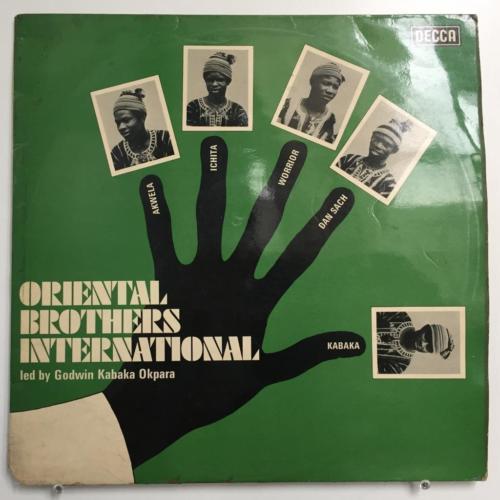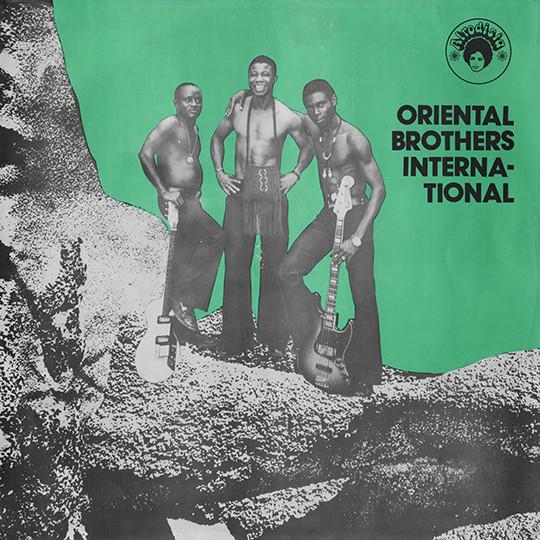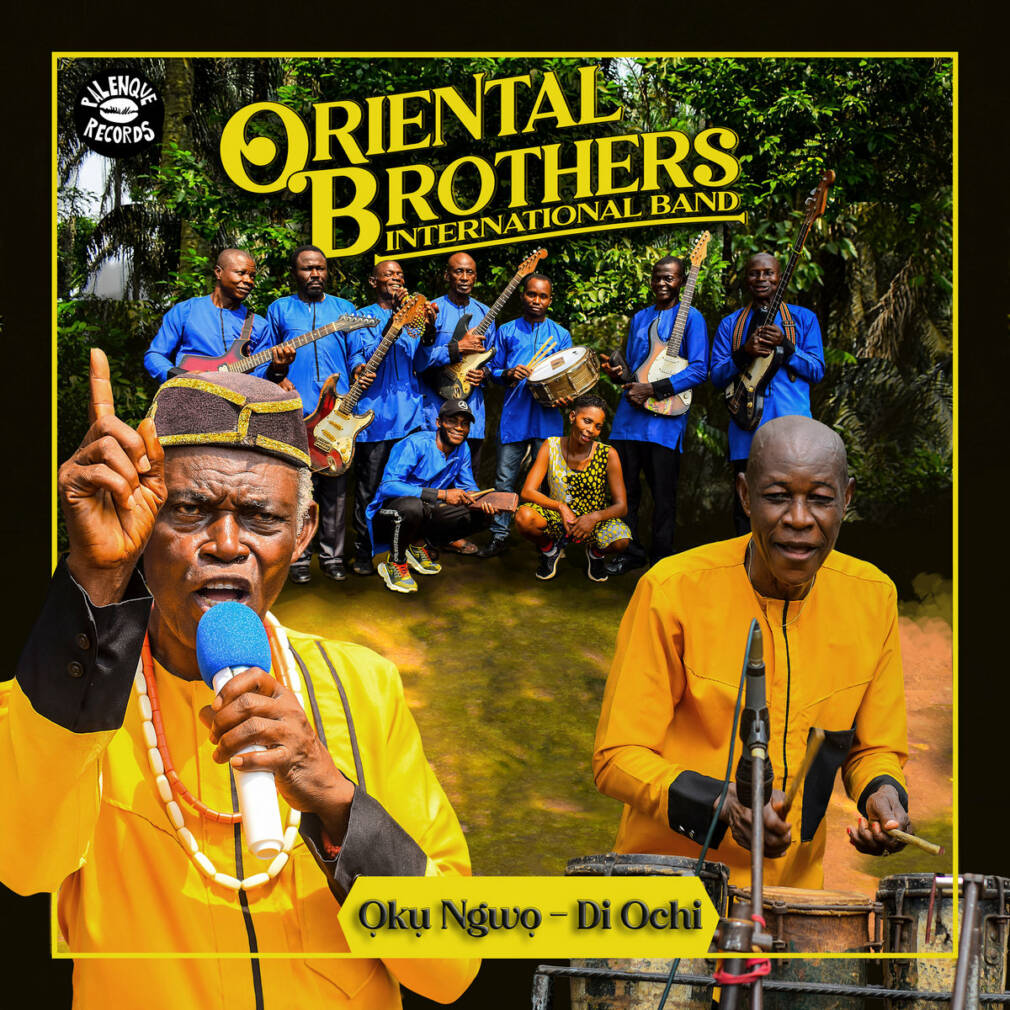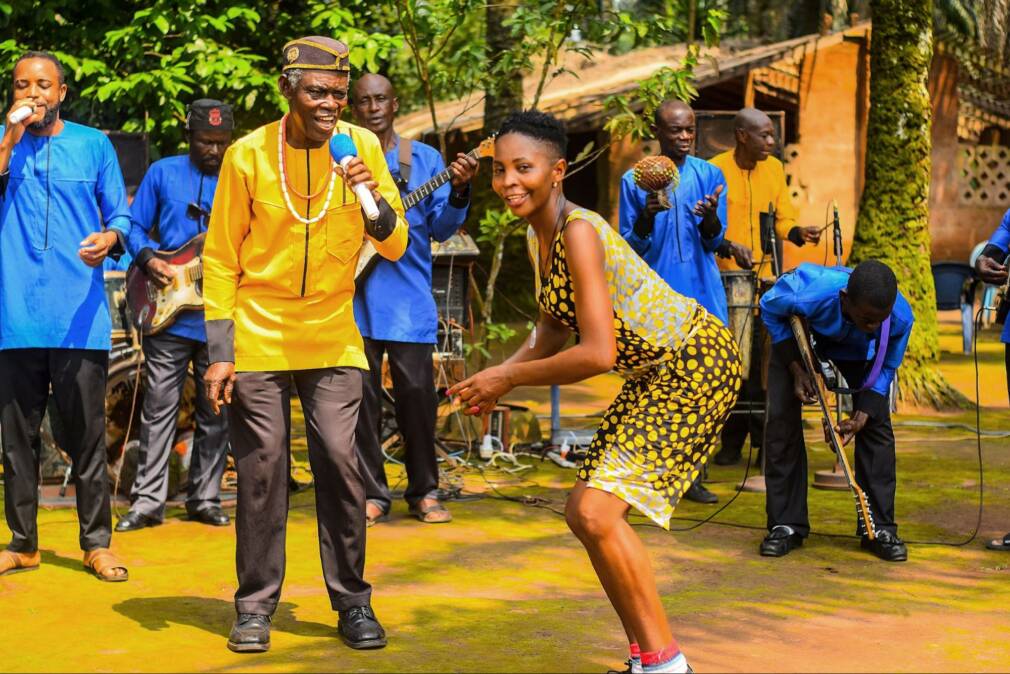Listening to O Ku Ngwo Di Ochi (the palm wine tapper), the new album by the Oriental Brothers International Band, is like stepping back in time. We find ourselves in the era that followed the terrible Biafran war which, from 1967 to 1970, decimated the lives of more than a million people in eastern Nigeria. While this trauma has never completely faded from people’s minds and the ghosts of secessionists still regularly haunt the news, the sound of this group’s Igbo-style highlife (the Igbo being the main ethnic group in south-eastern Nigeria) resolutely embodies the spirit of celebration and optimism that the return of peace made possible.
Their particular sound, which draws on natural rhythms and weaves in incredible melodic layers thanks to its 5 guitars (4 plus a bass), has been respected in the production of this new record, which has managed to retain the authenticity of the band’s seminal years – the 70s and 80s. This was the period when the band, founded by Dan Satch Opara, released most of its records (the first one being in 1973). Some of their albums, through the miracles and mysterious circulations that linked the shores of the ‘Black Atlantic’, would end up 20 years later on the turntables of the picos, the sound systems in northern Colombia and also the land of choice for the champeta, the magical melting pot within which African music was recycled to make hits for ‘Africolombia’.
The name is one particularly adored by Lucas Silva, the founder of Palenque records. He discovered the Oriental Brothers International Band thanks to the sound systems of Cartagena and, remixed in a Colombian style, their songs became champeta hits, renamed “La Pijama De Mi Abuelo”, and “Echale Agua A La Moto”. When Silva found out that the Orchestra still existed, with its founding father at the helm, he didn’t waste any time getting in touch.

Three brothers and five fingers
Ferdinand Dan Satch Chukuemueka Opara was still there, where he had always been, in his town of Owerri, situated halfway between Port-Harcourt and Onitsha. It is to him that we owe the group’s founding as well as its ongoing existence. Since the Band’s formation, in 1973, Satch has never stopped playing. Despite the infighting and the schisms that weakened the group during the 70s, and guitarist Kabaka and singer Sir Warrior leaving to form their own bands, he kept playing. Although the three brothers would cross paths again, they were never quite as united as they had been in that first, pioneering Band to which Satch was the key.
In forming the group, Satch had gone against his parents’ advice. He promised that if things didn’t work out he would return to his steady job as a car mechanic. He never went back to the garage – once he’d formed the nucleus of the first band he took the musicians to Kano (the big city in North Nigeria) on tour. But the promoter, as it turned out, had made false promises. To make up for it, Satch took the band to Lagos, where he was sure he could find them a good place in a club. After a few gigs work dried up and the band found themselves in difficulty again. Everyone wanted to get back East but no one had any money. Satch vowed to come up with a plan to earn them enough money to pay for their return journey home. They ended up taking up residence in Ikeja, in one of the small hotels in the area, where they hosted parties. This lead to them recording their first album which was released on Afrodisia, one of Decca’s labels. Satch chose the name Oriental Brothers in reference to their region of origin and the magical trio of three brothers who lead the group (himself, Kabaka and Sir Warrior) and who had put in most of the work.

Triumphs and tribulations
The next four years were the golden years, and the band had so many successful songs that an appetite for leadership took over, inviting discord within the group. Kabaka in particular, a virtuoso guitarist, no longer enjoyed being put forward as the leader of the band (see cover below) when it was actually Satch who was in charge. In 1977, he was the first to leave to form his own group, soon followed by Sir Warrior, who would become the big star of Igbo highlife. Satch had an inkling of this separation when, according to him, he composed “Ebele onye uwa”, a song that tells of ‘how people conspire to break up a band when they don’t like its success’.
The main trio only came together again twice in the studio (in 1987 and 1996) before Sir Warrior died in 1999. As for Godwin ‘Kabaka’ Opara, he’s still with us, living very modestly in his village. Palenque Records reissued one of his best records a few weeks ago. As for Satch, although he has managed to keep the Orchestra going (and still plays with percussionist Aquila, much like in the early days of the group) he laments having been forgotten by his country and, in particular, by the government. He feels that the joy brought by the Orchestra after many terrible years of war has never been properly acknowledged. This criticism could already be understood in the song “Iheoma Adighi Onye Oso”, which recalled that while all the civil servants received the ‘Udoji bonus’ to increase their salaries, the Oriental Brothers, who did so much for post-war harmony, remained ignored, without any proper recompense in sight.
Lucas Silva hasn’t yet made it to Owerri – given the security situation in Imo State, and in the south and east of Nigeria in general – but he has nevertheless managed, with the help of his Nigerian partners (such as Odogwu Entertainment), to bring Satch and his Oriental Brothers back into the studio for five tracks which, as their leader assures us, ‘are capable of curing high blood pressure and can even…raise the dead’. For the dead, it’s a bit early to say, but for the rest, it’s certain that Oriental-style highlife is the best remedy for crises and gloom.
Listen to O Ku Ngwo Di Ochi.





